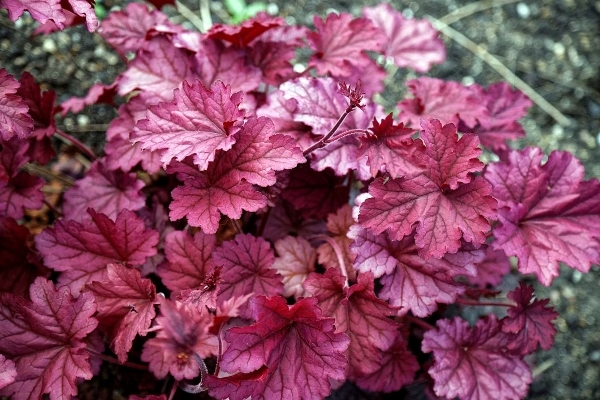
Coral Bells
Botanical Name
:
Heuchera spp.
Plant Type
:
Herbaceous perennial
Seasons
:
Plant in spring or fall; blooms in spring and summer
Sun Level
:
Full sun, partial sun, or shade; many varieties develop their best leaf color in full sun of at least 6 hours of daily sunlight
Ideal Soil Temperature for Planting
:
60°F to 70°F (15°C to 21°C)
Soil Type
:
Chalk, clay, loam, or sand; prefers moist, well-drained soil amended with organic matter
Hardiness Zones
:
4–9 (USDA)
Germination
:
2–8 weeks
P.H. Level
:
Acid to neutral (6.0–7.0)
Water/Irrigation
:
Average water needs; keep soil moist
Fertilization
:
In spring, apply a thin layer of compost or a balanced slow-release granular fertilizer around the base of the plant
Habit
:
Clumping, mounding
Propagation
:
Division or seed; divide every 3 to 4 years
Final Plant Height
:
1–3 ft
Spread
:
6–30 inches
Flowers
:
Tiny bell-shaped flowers; colors range from white, peach, pink, to bright red; flower stalks rise 12–24 inches above the plant mound
Attracts
:
Butterflies, bees, and hummingbirds
Uses
:
Ground cover, edging in perennial borders, group plantings; adds colorful foliage to gardens; good for beds and borders, small gardens, underplanting roses, and shrubs
Companions
:
For shade, pair with astilbe, bleeding heart, ferns, hellebores, hosta, Japanese forest grass, and lamium. For sunny spots, combine with artemisia, bugleweed, daylilies, geranium, iris, lady’s mantle, lysimachia, and ornamental grasses
Pruning
:
Deadheading spent flowers increases bloom production through summer and fall; prune ragged leaves to encourage new growth
Toxicity
:
Generally non-toxic but ingestion may cause mild reactions, such as stomach upsets
Pests
:
Potential insects include weevils, Japanese beetles, mealybugs, and foliar nematodes
Diseases
:
Susceptible to fungal diseases such as powdery mildew, rust, and bacterial leaf spot
Fun Fact
:
Coral Bells were among the first plants exported to Europe in the 1600s by early American explorers
Botanical Name
:
Heuchera spp.
Plant Type
:
Herbaceous perennial
Seasons
:
Plant in spring or fall; blooms in spring and summer
Sun Level
:
Full sun, partial sun, or shade; many varieties develop their best leaf color in full sun of at least 6 hours of daily sunlight
Ideal Soil Temperature for Planting
:
60°F to 70°F (15°C to 21°C)
Soil Type
:
Chalk, clay, loam, or sand; prefers moist, well-drained soil amended with organic matter
Hardiness Zones
:
4–9 (USDA)
Germination
:
2–8 weeks
P.H. Level
:
Acid to neutral (6.0–7.0)
Water/Irrigation
:
Average water needs; keep soil moist
Fertilization
:
In spring, apply a thin layer of compost or a balanced slow-release granular fertilizer around the base of the plant
Habit
:
Clumping, mounding
Propagation
:
Division or seed; divide every 3 to 4 years
Final Plant Height
:
1–3 ft
Spread
:
6–30 inches
Flowers
:
Tiny bell-shaped flowers; colors range from white, peach, pink, to bright red; flower stalks rise 12–24 inches above the plant mound
Attracts
:
Butterflies, bees, and hummingbirds
Uses
:
Ground cover, edging in perennial borders, group plantings; adds colorful foliage to gardens; good for beds and borders, small gardens, underplanting roses, and shrubs
Companions
:
For shade, pair with astilbe, bleeding heart, ferns, hellebores, hosta, Japanese forest grass, and lamium. For sunny spots, combine with artemisia, bugleweed, daylilies, geranium, iris, lady’s mantle, lysimachia, and ornamental grasses
Pruning
:
Deadheading spent flowers increases bloom production through summer and fall; prune ragged leaves to encourage new growth
Toxicity
:
Generally non-toxic but ingestion may cause mild reactions, such as stomach upsets
Pests
:
Potential insects include weevils, Japanese beetles, mealybugs, and foliar nematodes
Diseases
:
Susceptible to fungal diseases such as powdery mildew, rust, and bacterial leaf spot
Fun Fact
:
Coral Bells were among the first plants exported to Europe in the 1600s by early American explorers
Written by Nondiah Khalayi – https://www.linkedin.com/in/nondiah-khalayi/

